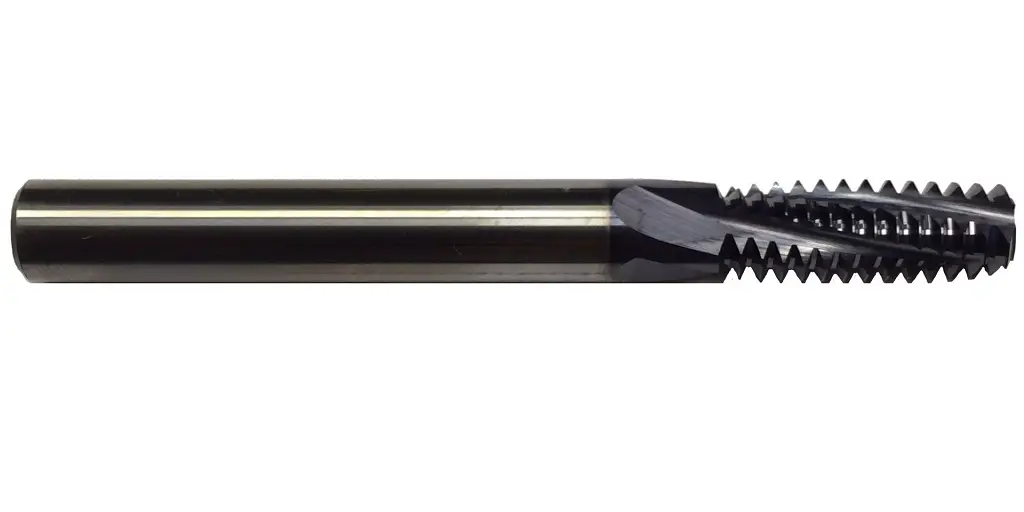Thread milling, in contrast to cutting threads with a tap and die, has a number of advantages (see below). But before we can cover these, let’s take a look at some other important relevant information.
Types of Thread Mills
First, there are numerous types of thread mills. Some of the more common types are:
● Straight flute thread mills: These have straight flutes and are best for general-purpose thread milling applications, especially if you work on a variety of materials.
● Helical flute mills: These have helical flutes, which are best for high-speed milling applications. They’re also more suitable for thin-walled or tough materials and leave a smoother finish.
● Single profile mills: These have multiple flutes, making it possible for them to cut a variety of different pitch ranges, lengths, and diameters.
Common Terms Associated with Threads and Milling
Some of the following terms are relatively common in thread milling applications:
● Pitch: The distance between two corresponding points on a thread.
● Flute: These are the sharp slots or teeth that spiral upwards along the mill.
● Threads per inch (TPI): The number of threads that fit within a one-inch length along the surface of a mill. The higher the TPI rating, the smoother the finish the mill can provide.
● Helix: The helix is the spiral pattern produced by the threads as they rotate around a cylindrical surface.
● Lead angle: The angle between the helix of the thread and a plane perpendicular to the axis.
● Major diameter: The diameter between two corresponding thread roots.
● Minor diameter: The diameter between two corresponding thread crests.
● Form: the shape of the thread profile in cross-section.
Thread Mill Finishes
The following finishes are common on thread mills:
● Titanium Nitride (TiN): This coating decreases the tool’s coefficient of friction, enabling the tool to be run at higher speeds. It also potentially increases chip flow in softer materials.
● Titanium Carbonitride (TiCN): This coating is similar to TiN, but it is harder and more wear-resistant.
● Aluminum Titanium Nitride (AlTiN): Extremely hard and oxidation resistant, AlTiN-coated tools can be run at higher speeds with lesser risk of overheating, wearing, or oxidizing.
● Titanium Aluminum Nitride (TiAlN): This coating is extremely hard and wear-resistant. It is also highly resistant to oxidation.
Thread Milling Advantages
Thread milling, as opposed to cutting threads with a tap and die, offers numerous advantages, including but not limited to:
● There are no limits on bore size.
● One tool can potentially cut a number of different types of threads.
● One tool can cut both internal and external threads.
● Rapid feed rates and high cutting speeds improve process efficiency and result in shorter cycle times.
● Milling produces a superior finish to tapping.
● Superior for harder and exotic materials.
● Better thread quality in softer materials; taps tend to tear or deform the material instead of leaving precise threads.
● Thread milling allows the operator to create a thread profile all the way to the bottom of a hole.
● Milling potentially consumes less energy than tapping threads.
Where Can You Get Solid Carbide Thread Mills (NPT, NPTF, UN, and Metric)?
Looking for high-quality solid carbide thread mills for NPT, NPT, UN, and metric threads?
Visit Online Carbide; they sell a wide range of high-quality thread mills and other solid carbide end mills and drills for specialty applications. You can learn more via the previous link or contact them at 630-238-1424.
For More Information about Variable End Mill and Solid Carbide End Mills For Sale Please Visit : Online Carbide






